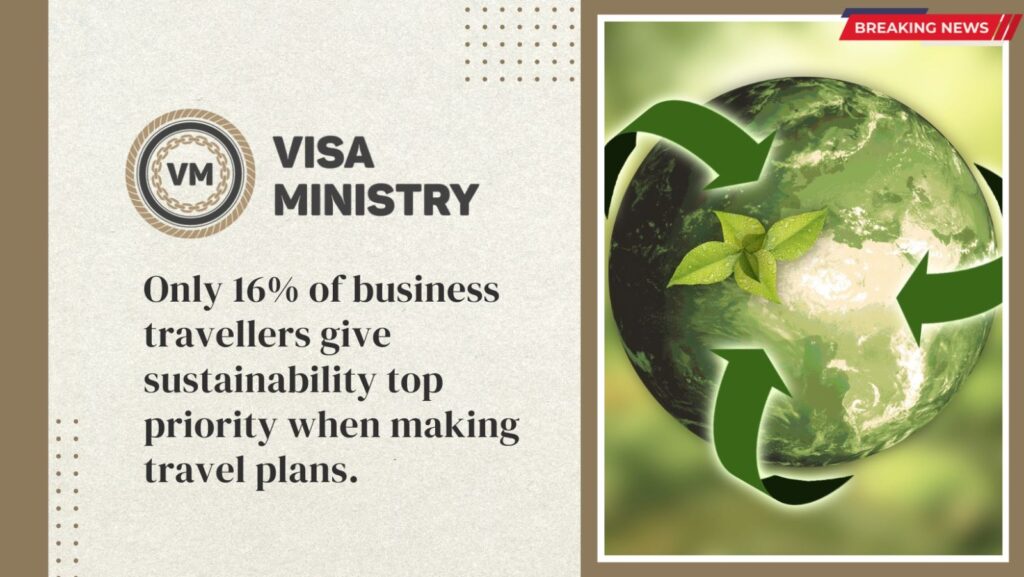The world authority on expenditure optimisation, Emburse, has released the results of its most recent study on British business travellers’ views on sustainability. As trip volumes reach pre-pandemic levels, the Censuswide poll of 1,003 employees and 254 employers sought to understand where sustainability fits within the business travel agenda. The findings revealed that while many businesses and their travelling staff are concerned about the environment, the majority have not yet taken real steps to implement sustainable travel and are instead putting the onus on the other party to do so.
The report states that 71% of organisations have official sustainability policies or standards in place, and 38% of businesses reported increasing their investment in sustainability. However, just 37% of these companies really apply these rules when making reservations and approving travel expenses.
When planning travel arrangements, only one out of every six employees named sustainability as their top concern, far below both cost and traveller convenience. While 71% of business travellers believe their employer should do more to promote sustainable travel, environmental concerns still rank low on their list of priorities when making travel arrangements. The majority of workers (76%) also concurred that if financial incentives or sustainability initiatives were offered, they would choose a more sustainable form of transportation.
Employee desire for incentive programmes for sustainable travel has increased by 19% since Emburse’s 2021 survey on sustainable business travel post-pandemic. Only one in nine (11%) firms have named sustainability as a crucial consideration when making travel arrangements for work, according to the data from 2021. Two years later, both employers and employees still prioritise cost when making travel arrangements for business.
Key conclusions
Currently, 71% of businesses have sustainability policies that offer advice on sustainable travel.
38% of which have a written policy in place, while 33% have a set of guidelines.
While only 37% of companies actively enforce policies to promote sustainable travel for both commuting and business purposes, 43% are considering doing so. These initiatives and incentives include travel budget incentives, cycle to work programmes, and remote training.
o 25% of companies don’t have a sustainable business travel policy.
When travelling, 38% of businesses have raised their investment in sustainability, whereas 6% do not intend to do so.
Due to rising corporate costs, more than a quarter (27%) have cut down on sustainability investments.
o When booking business travel, 31% of business travellers prioritise cost-effectiveness, followed by:
Accessibility and convenience (27%)
Loyalty and rewards programmes (21%)
Environment (16%)
o Meanwhile, only 26% would proactively cut down on travel to reduce their carbon footprint
Employee appetite for sustainable travel
o 71% of employees want their employer to do more to enable sustainable travel
A small minority (7%) of employees do not want employers to do more to enable sustainable travel
o 76% of employees would choose a more sustainable mode of transport if their employer provided programmes or financial incentives
Employee demand for incentivised sustainable travel has increased by 19% since 2021, according to previous Emburse findings
o 74% employees believe it is their organisation’s responsibility to do more to enable sustainable business travel, regardless of cost
Jeroen van Velzen, SVP Travel & Mobility at Emburse, commented: “Business travel has defied expectations by seeing an almost complete return to pre-pandemic levels. But we can’t just go back to business as usual when it comes to emissions. Businesses and travellers both need to work on reducing their carbon footprint. It’s promising that more organisations are putting sustainability guidelines and policies into place, but this data shows we still have a long way to go until it becomes a priority.”
“Whilst travel managers could strictly enforce their companies’ policies to help achieve carbon goals, this heavy-handed approach risks alienating travelling employees. Educating travellers about the impact of their trips in easy-to-understand terms – like how many houses could be powered by the energy used on a trip – can lead to much higher levels of compliance. Employers need to provide employees with tools to make smarter decisions, and employees need to use that insight to make more environmentally friendly travel plans. We need to move beyond paying lip service to environmental issues and turn good intent into meaningful action.”
Source- Travel daily
